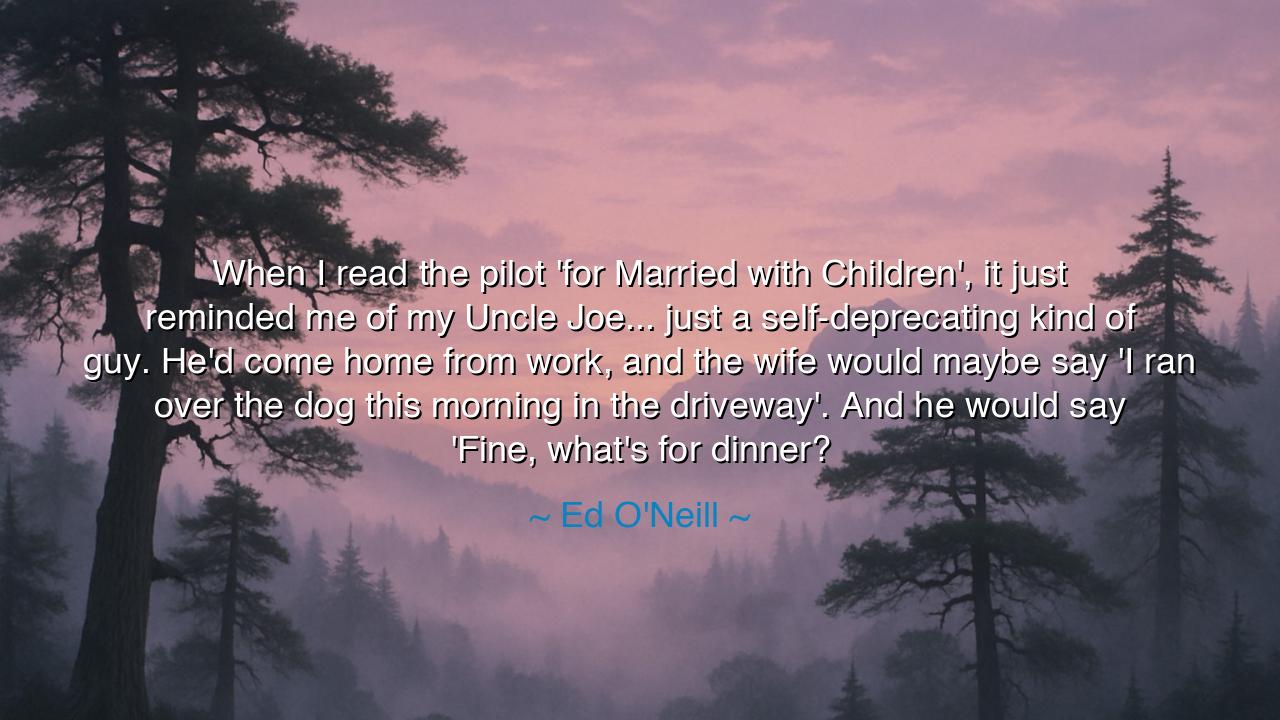
When I read the pilot 'for Married with Children', it just
When I read the pilot 'for Married with Children', it just reminded me of my Uncle Joe... just a self-deprecating kind of guy. He'd come home from work, and the wife would maybe say 'I ran over the dog this morning in the driveway'. And he would say 'Fine, what's for dinner?






The words of Ed O’Neill—“When I read the pilot for Married with Children, it just reminded me of my Uncle Joe... just a self-deprecating kind of guy. He’d come home from work, and the wife would maybe say, ‘I ran over the dog this morning in the driveway.’ And he would say, ‘Fine, what’s for dinner?’”—speak not only to humor but to the profound human art of endurance. Beneath the laughter lies an ancient wisdom: the strength of those who bear life’s absurdities with stoic acceptance and quiet resilience. O’Neill’s reflection reveals that the humor of the ordinary man—his Uncle Joe—is not born of indifference, but of survival. It is the humor of one who has seen enough of hardship to know that railing against fate changes nothing, while laughter, however weary, keeps the heart intact.
The figure of Uncle Joe, as O’Neill describes him, is not unlike the humble heroes of the ancient world—men who endured the long day’s labor, who returned home carrying the invisible burdens of duty, and who faced life’s misfortunes not with despair, but with dry wit. His “self-deprecating” spirit is the very essence of what the Stoics once called apatheia: not apathy, but calm acceptance. When he says, “What’s for dinner?” after hearing of disaster, he does not diminish the event’s gravity; he asserts his will to carry on. His humor becomes a shield, not of denial, but of dignity. For even when life strikes with absurd cruelty, man may still choose his response. And in that choice lies his freedom.
This, indeed, is what O’Neill found in the script of “Married with Children.” Beneath its crude comedy and exaggerated dysfunction, he recognized something deeply true about the human condition. The character of Al Bundy, the weary shoe salesman with crushed dreams and relentless sarcasm, is not a caricature of despair, but an embodiment of working-class stoicism. His laughter is bitter, yes—but it is still laughter, and that makes it divine. Like his Uncle Joe, Al Bundy’s humor springs from endurance; it is the way the ordinary man survives a world that seldom shows mercy. O’Neill, by seeing this truth, turned what might have been mockery into something closer to tragedy made bearable through comedy.
The ancients themselves understood this paradox. In Aristophanes’ comedies, the laughter of the people was never frivolous—it was rebellion wrapped in humor. When faced with corruption, war, or poverty, the Greeks laughed not to forget, but to endure. The same spirit lives in O’Neill’s Uncle Joe and in Al Bundy. To laugh when the dog has been run over, to shrug and ask for dinner, is not cruelty; it is courage—the courage to keep walking, eating, and loving, even when life refuses to make sense. This is the laughter of the wise, who have ceased expecting fairness from the world.
In this, there is also love. For beneath his gruffness, O’Neill’s Uncle Joe is a man of family—a man who returns home no matter how long the day, who sits down to dinner and continues the ritual of life. His humor keeps the household turning; his stoic calm keeps despair from spreading. Such men are the silent pillars of families, societies, and civilizations. They are not saints or poets; they are laborers, fathers, uncles—ordinary souls whose quiet constancy holds the world together. When O’Neill read that script and saw Uncle Joe’s reflection, he understood that Married with Children was not simply a comedy—it was a mirror of every weary, enduring man who keeps showing up, no matter how ridiculous life becomes.
There is a lesson in this for all who labor beneath the weight of the ordinary. Self-deprecation—the ability to laugh at one’s struggles, one’s failures, even one’s pain—is not weakness. It is the wisdom of those who know that life will never be entirely fair, and that despair serves no purpose. In learning to laugh at the absurd, one learns to rise above it. O’Neill’s Uncle Joe, shrugging at tragedy, teaches us that while we cannot control fate, we can control our attitude, and that simple mastery gives us power greater than complaint or self-pity ever could.
So remember this, my friends: when life drives its wheels across your plans—when disappointment knocks upon your door—meet it as Uncle Joe did. Do not let bitterness steal your calm. Smile, even if the smile is weary. Crack a joke, even if the laughter is half-broken. Sit down to dinner, for the world goes on. For it is not the grand gestures, nor the heroic triumphs, that preserve the human spirit, but the quiet humor and humility of those who choose to endure. In laughter, the soul finds its breath again; and in acceptance, it finds its peace.
Thus, in the simple, humorous recollection of Ed O’Neill, we glimpse the timeless strength of ordinary men—the stoics of the everyday, the philosophers of the kitchen table—whose laughter, half irony and half grace, keeps the fire of humanity burning against the chill of an indifferent world.






AAdministratorAdministrator
Welcome, honored guests. Please leave a comment, we will respond soon